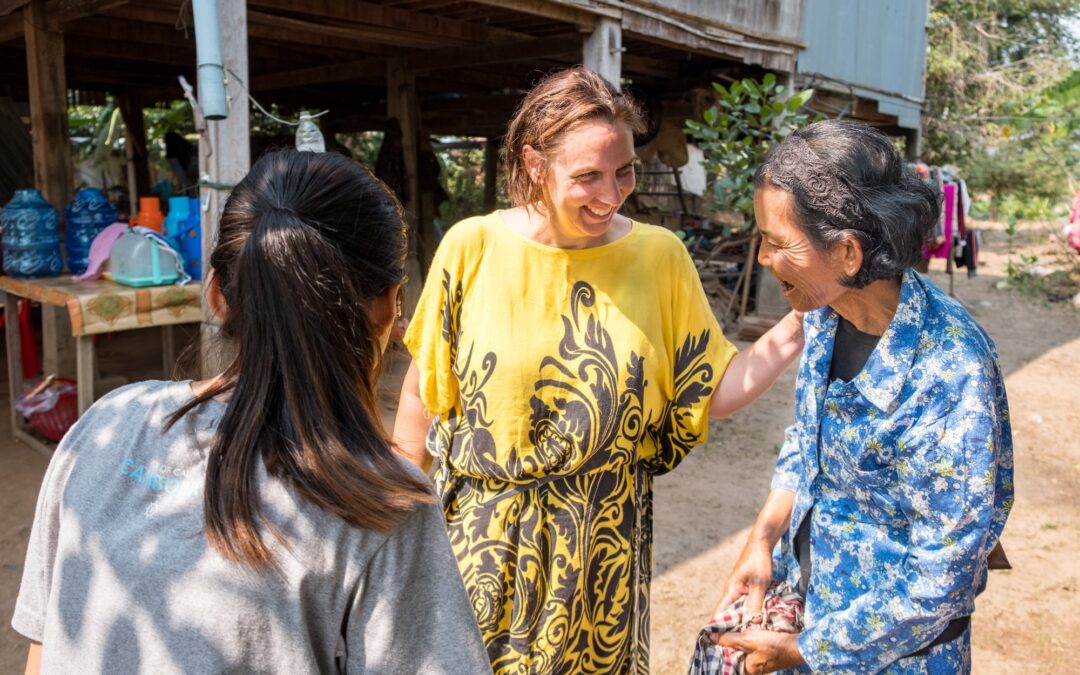As Eleanor wraps up six years as EWB Chief Executive Officer this month, she shares some reflections about her experience leading the organisation over the years:
An Indigenous elder on an island in Kratie, Cambodia, once took me aside and asked directly, what can engineers do to stop her island being flooded when a dam is built, further up the Mekong? The community had been there for thousands of years and now engineers were planning a dam that would destroy her home. However, engineers could also save her ancestral home.
I hadn’t realised until I joined Engineers Without Borders that engineers play such a critical role in creating the world we live, work and play in. Engineers have got us here – the good and the bad – and engineers are shaping the future our children will inherit. That’s a huge responsibility and it’s an incredible opportunity.
When we were developing our 2030 Strategy, we threw everything up in the air. Through deep consultation with our network we landed on technology stewardship as our primary focus. Owning our place as engineers and practising with full awareness of the impact we have on the world. We’re aware that the decisions we make now will influence health outcomes, livelihood outcomes, equity and inclusion outcomes. Our strategy takes this responsibility and owns it.
EWB is unique because we have socio-technical engineers who work in international development. Our work in remote Australia emphasises First Nations allyship. And, we put the spotlight on engineering for people and the planet in our STEM training programs. I’m so proud that in the strategy design process, we saw all that and owned it. Our catchphrase was “it’s possible”, because it is and we are proving that.
It’s possible to provide engineering role modelling to kids in remote Aboriginal communities, led by First Nations engineers – even though they are still significantly underrepresented in the sector.
It’s possible to design a flow-through system to mitigate rising sea levels for a Vanuatu village that was led by community wisdom and coupled with the technical expertise of our team and a pro bono industry partner.
It’s possible to employ women engineers with limited experience in Timor-Leste and provide on-the-job mentoring so that they quickly become excellent site engineers. They were soon checking the work of contractors for the major rebuild of two water transmission pipelines that services two-thirds of Dili’s water supply.
When we say no one left behind, we mean it. We don’t hold back because it’s too far, or too hard or we haven’t done it before. We try because we can access the skills and experience of our engineering network and this means we are able to punch above our weight. We can go to remote parts of Australia, we can respond to households affected by flooding in Northern NSW, we can deliver education programs at scale, we can deliver highly technical engineering with social and environmental outcomes, successfully and sustainability.
I’ve loved working with EWB over the past six years and I have learnt a lot in this time. I’m proud of where we are now. I’m excited to hand over now and see where EWB goes next. Thanks to the team and by that, I mean the Board, staff, our steadfast donors, partners and the EWB network. It takes a village!
The dam in Kratie hasn’t been built yet and who knows if it will. We did however build a water system for the village that led to better quantity and quality of water, that’s being used for farming and in homes for drinking and washing. In the long term, this should result in greater crop yields, increased income and better health outcomes for the people living there – which in turn leads to a resilient community and a stronger voice. With engineers taking the responsibility for the downstream impact of their work, anything is possible.
Thank you Eleanor for the energy, dedication and leadership that you brought to EWB over the past six years. We wish you all the very best!


